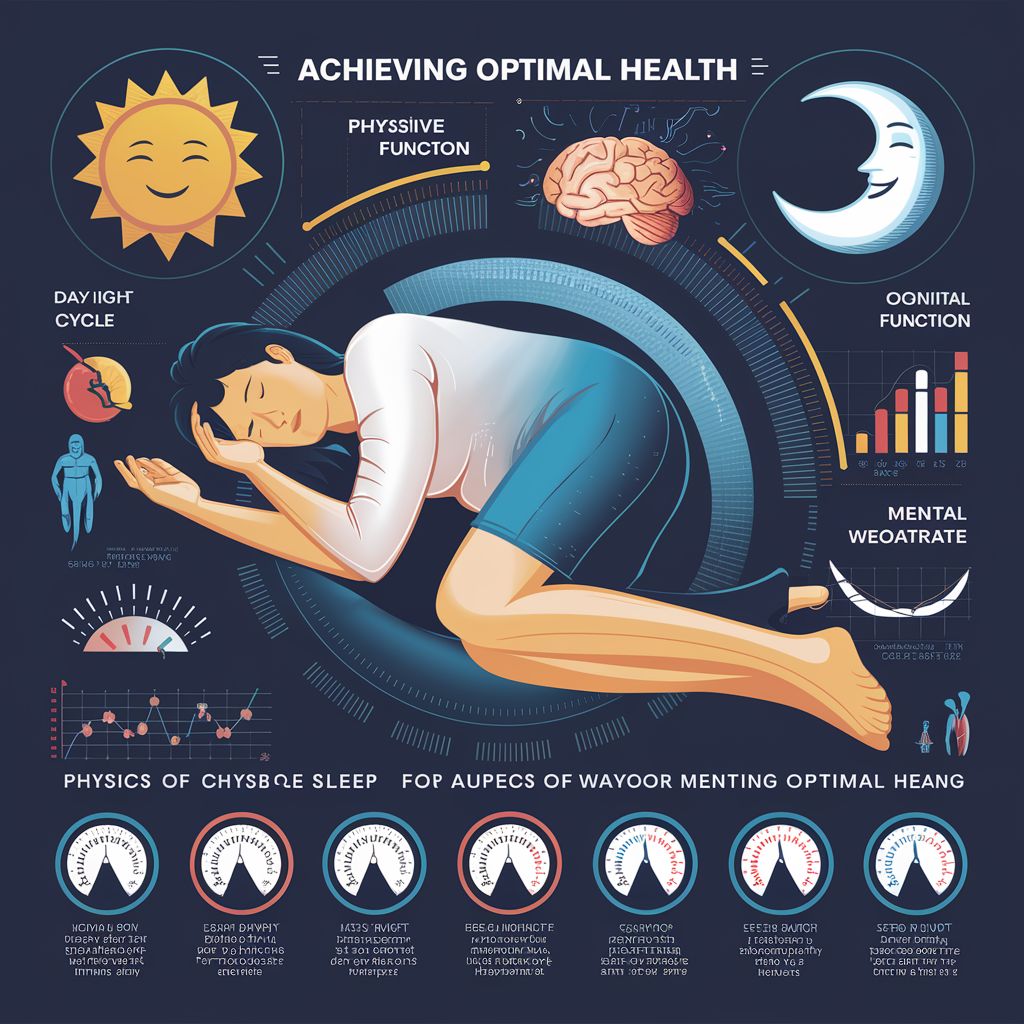The Role of Sleep in Achieving Optimal Health
Have you ever found yourself laying awake at night, staring at the ceiling, mentally replaying the day’s events while your mind races through tomorrow’s to-do list? You’re not alone. Many people underestimate the profound influence that sleep has on our overall health. While some might argue that sleep is a luxury, it is, in fact, an absolute necessity—a non-negotiable component of our well-being. Let’s delve into the intricate relationship between sleep and health, exploring why it should be at the forefront of our wellness routines.
The Science of Sleep: What Happens When We Snooze?
First off, let’s take a peek under the hood of what actually happens while we sleep. Sleep is not just a passive state of rest; it’s a complex biological process that plays a crucial role in various bodily functions. During sleep, our bodies undergo several stages, cycling through light sleep, deep sleep, and REM (Rapid Eye Movement) sleep multiple times throughout the night. Each stage serves its own purpose, contributing to physical and mental restoration.
For instance, deep sleep is when your body works on repairing muscles, tissues, and bones. It’s your natural designer—molding and shaping you into peak physical condition. REM sleep, on the other hand, is where the magic for your brain occurs. This is when your brain processes information, consolidates memories, and fosters creativity. Ever had an “aha” moment after a good night’s sleep? You can thank REM sleep for that burst of inspiration.
How Much Sleep Do We Really Need?
Ah, the age-old question! The National Sleep Foundation recommends that adults aim for 7 to 9 hours of sleep per night. However, individual needs can vary. Some people might feel refreshed after just 6 hours, while others may need a full 10 to feel their best. It’s a bit like finding the right pair of shoes—you need to try a few styles before you discover what fits best.
But let’s not kid ourselves; in our fast-paced world, sleep often takes a backseat to work, social media, and binge-watching the latest series on Netflix. I remember a time when I thought I could function on little sleep, convinced that power naps were the key to my productivity. Spoiler alert: they weren’t. My attempts at squeezing productivity from sleep deprivation turned out to be more of a horror show than a success story. I was irritable, unfocused, and, let’s be honest, downright grumpy.
The Health Risks of Sleep Deprivation
It’s easy to brush off sleep as an inconsequential aspect of life, but the consequences of neglecting it can be grave. Chronic sleep deprivation has been linked to a host of health issues, including:
- Cardiovascular problems: Sleep is crucial for heart health. Studies show that insufficient sleep can increase the risk of high blood pressure and heart disease.
- Diabetes: Lack of sleep affects insulin sensitivity and can lead to increased blood sugar levels.
- Obesity: Sleep deprivation disrupts hormones that regulate appetite, increasing cravings for high-calorie foods.
- Impaired immune function: A well-rested body is better equipped to fend off infections. Skimping on sleep can leave you more susceptible to illnesses.
Remember the last time you caught a cold? It might not have been just bad luck; it could have been your body’s way of telling you that you needed more rest. I recall a particularly grueling project at work that left me running on fumes. Not surprisingly, I ended up spending the next week nursing a nasty cold. Coincidence? I think not.
The Psychological Impact of Sleep
Beyond the physical ramifications, sleep—or lack thereof—can wreak havoc on our mental health. Research indicates that inadequate sleep is associated with increased levels of anxiety, depression, and overall emotional instability. Have you ever noticed how a lack of sleep can make even the smallest challenges feel insurmountable? It’s as if the world is a bit darker, and every minor inconvenience feels like a personal attack.
In my own experience, I’ve found that after a night of tossing and turning, even the most mundane tasks feel daunting. Whether it’s a simple email or a dinner invitation, my brain seems to have a knack for overthinking every little detail. Psychologists suggest that this is due to sleep’s role in regulating emotions and processing stress. So next time you’re feeling overwhelmed, consider whether a good night’s sleep might be the solution.
Sleep and Performance: The Athlete’s Perspective
Now, let’s switch gears and talk about athletes. You might think that elite athletes are solely focused on rigorous training and nutrition, but sleep is just as critical to their performance. In fact, many professional athletes prioritize sleep as a part of their training regimen. Olympic swimmer Michael Phelps famously took naps throughout the day to ensure he was at peak performance for his events. And who could blame him? Sleep is the unsung hero of athletic success.
Research conducted on college athletes revealed that those who slept more than 8 hours per night showed improved performance in both physical and cognitive tasks. They were quicker, stronger, and had better reaction times. It’s like giving your body a supercharge, a little extra boost to help you reach your potential. A well-rested athlete is a formidable opponent—just ask any coach.
Creating a Sleep-Friendly Environment
So, knowing all this, how do we cultivate a sleep-friendly environment? It’s not as daunting as it sounds. Here are a few tips that might help:
- Establish a routine: Try to go to bed and wake up at the same time each day. Your body loves consistency!
- Limit screen time: Exposure to blue light from phones and computers can interfere with melatonin production, making it harder to fall asleep.
- Create a restful environment: Make your bedroom a sanctuary. Keep it dark, cool, and quiet. Consider blackout curtains and a white noise machine if you’re easily disturbed.
- Mind your diet: Avoid caffeine and heavy meals close to bedtime. Trust me, nothing ruins a good night’s sleep like a late-night pizza binge.
I remember a time when I treated my bedroom like a makeshift office—laptops, papers, and a myriad of distractions cluttering the space. It was no surprise that my sleep suffered. Once I made a conscious effort to create a serene environment, my sleep quality improved dramatically. It truly is all about setting the stage for success.
The Power of Napping
Let’s not overlook the power of napping. For those of us who find it challenging to get a full night’s sleep (hello, parents and busy professionals), a well-timed nap can work wonders. Studies suggest that short naps of 20 to 30 minutes can boost alertness and enhance cognitive performance. Just enough time to recharge without entering the deep sleep cycle that leaves you groggy.
There’s something almost euphoric about curling up for a quick nap—like a mini-vacation for your brain. I once took a 30-minute nap before an important meeting, and I emerged feeling like a new person, ready to tackle anything that came my way. Just be cautious not to nap too late in the day, or you might find yourself staring at the ceiling again come bedtime.
Mindfulness and Relaxation Techniques
Another aspect worth exploring is the role of mindfulness and relaxation techniques in promoting better sleep. Practices such as meditation, progressive muscle relaxation, and even gentle yoga can help soothe the mind and prepare the body for rest. These techniques can be particularly beneficial for those who find their brains buzzing with thoughts at night.
One evening, after a particularly hectic day, I decided to give meditation a shot. I sat cross-legged on my bedroom floor, eyes closed, and attempted to clear my mind. At first, my thoughts were bouncing around like a pinball machine. But with some gentle guidance from an app, I finally settled into a state of calm. That night, I slept like a baby—waking up refreshed and ready to take on the world.
Sleep Disorders: When to Seek Help
While we can all experience occasional sleepless nights, persistent sleep issues may indicate a deeper problem, such as insomnia, sleep apnea, or restless leg syndrome. If you find yourself regularly tossing and turning or waking up feeling like you’ve barely slept, it may be wise to consult a healthcare professional. They can provide guidance and help determine the best course of action.
Don’t shy away from addressing these issues. I learned this the hard way when I ignored my snoring (which didn’t just bother my partner but was a warning sign of sleep apnea). Once I sought help, I discovered tailored solutions that transformed my sleep quality. It was a game-changer—like flipping a switch from a dim light to full brightness.
The Bottom Line: Sleep is Non-Negotiable
As we’ve explored, sleep is not just a time for our bodies to shut down; it’s a vital component of our health and well-being. From boosting physical performance to enhancing mental clarity, the benefits of a good night’s sleep are undeniable. In a world that often glorifies hustle and productivity, it’s essential to remember that rest is equally important.
So, the next time you find yourself considering whether to hit the snooze button or scroll through social media, think of sleep as a superpower—a secret weapon in your arsenal for optimal health. After all, we all deserve to wake up feeling like champions, ready to conquer the day ahead.
In closing, let’s raise a glass (of chamomile tea, perhaps) to the importance of sleep. May we all prioritize rest and reap the rewards of a healthier, happier life.






